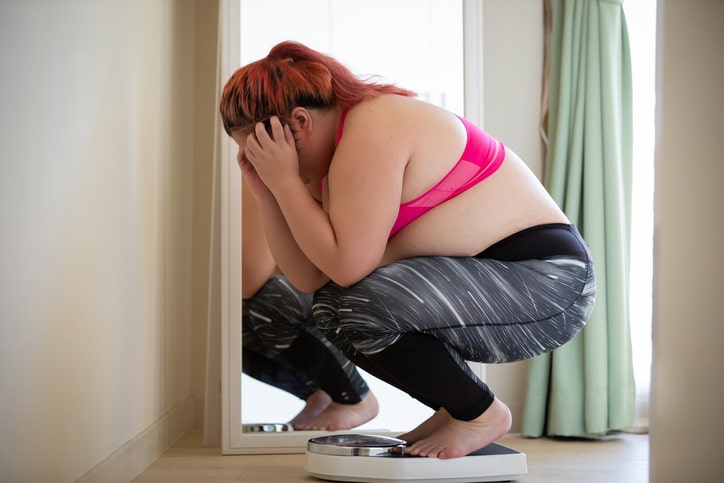It’s like a bad dream. You’re in your mid-30’s and the unwanted weight just keeps adding up. No matter what you do, the needle on the scale just keeps on going in the wrong direction. Weight loss can be more challenging during perimenopause for several reasons:
Hormonal Changes: Perimenopause is characterized by significant hormonal fluctuations, particularly a decline in estrogen levels. These hormonal changes can affect metabolism, leading to weight gain and difficulty losing weight. Lower estrogen levels can also result in fat being stored in different areas, such as the abdomen, which can be more resistant to weight loss.
Learn More About Bioidentical Hormone Replacement Therapy (BHRT)
Slower Metabolism: As women age, their metabolic rate naturally slows down. This means the body burns fewer calories at rest, making it easier to gain weight and more challenging to lose.
Muscle Loss: With age, muscle mass is gradually lost, contributing to a slower metabolism. Muscles burn more calories than fat and reducing muscle mass can make weight loss more challenging.
Increased Appetite: Hormonal changes can also affect appetite and food cravings. Some women experience increased appetite or cravings for high-calorie comfort foods, making it harder to maintain a calorie deficit for weight loss.
Sleep Disturbances: Many women experience sleep disturbances during perimenopause, such as insomnia or disrupted sleep patterns. Poor sleep quality can disrupt hormones that regulate appetite, leading to increased hunger and cravings for unhealthy foods.
Stress: Perimenopause can be stressful for many women due to hormonal changes, physical symptoms, and life transitions. Stress can lead to emotional eating and weight gain.
Lifestyle Factors: Women in perimenopause may have additional responsibilities and life stresses, making it more challenging to prioritize and adhere to a weight loss plan.
Bone Health: Many women are concerned about maintaining bone health during perimenopause, and they may avoid weight loss strategies that they fear will negatively impact their bone density.
Contact A BodyLogicMD BHRT Expert Today
To overcome these challenges and promote healthy weight loss during perimenopause, it’s essential to adopt a comprehensive approach that includes:
- Balanced Diet: Focus on a well-balanced diet that is rich in fruits, vegetables, lean proteins, and whole grains. Managing portion sizes and choosing nutrient-dense foods can help with weight control.
- Regular Exercise: Incorporate both cardiovascular and strength-training exercises into your routine. Building and maintaining muscle can boost metabolism.
- Stress Management: Practice stress-reduction techniques like meditation, yoga, or mindfulness to cope with the emotional challenges of perimenopause.
- Adequate Sleep: Prioritize good sleep hygiene to improve sleep quality, which can help regulate appetite and support weight loss efforts.
- Consult a Healthcare Provider: If you find weight loss exceptionally challenging, consult a healthcare provider or registered dietitian who can provide personalized guidance and recommendations.
Remember that weight loss during perimenopause may be slower and require more patience and perseverance. Focusing on overall health and well-being is important rather than just the number on the scale.

